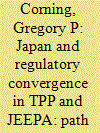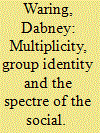|
|
|
Sort Order |
|
|
|
Items / Page
|
|
|
|
|
|
|
| Srl | Item |
| 1 |
ID:
191670


|
|
|
|
|
| Summary/Abstract |
Studies on the pattern according to which national power is allocated between nation states have historically focused on the great powers and the emerging powers. However, these powers are quite limited to a few dozen while the remainder of the countries, which correspond to the ‘weak states’, total more than a hundred. How is the distribution of power configured within the periphery? In what way is the international performance of each state conditioned by its endowment of national power? Although the theoretical bases on the periphery are broad and were specially developed in Latin America from the so-called ‘dependency theory’, there is a lack of studies that observe the configuration and distribution of national power in this area. This research generates a theoretical-methodological framework for the study of the rise and fall of the peripheral states. With the support of quantitative techniques, the size and composition of its national power are determined, and four new categories of states are discovered: Subregional Powers, Middle Peripheral States, Minor Peripheral States and Subperipheral States. The findings and the processed data provide a cutting-edge underpinning for future ‘peri-centric’ study cases.
|
|
|
|
|
|
|
|
|
|
|
|
|
|
|
|
| 2 |
ID:
191665


|
|
|
|
|
| Summary/Abstract |
This article argues that while uneven and combined development (U&CD) scholars have made great contributions to theorising the causal implications of societal multiplicity, the overtly normative contributions of U&CD scholarship remain thin. To address this gap, I propose a synthesis between U&CD and Enrique Dussel’s normatively oriented liberation philosophy. To enable this, U&CD must be stripped of its more causally oriented concepts, like the ‘whip of external necessity', which constrains the scope of normative analysis by confining it to sovereign states. Incorporating Dussel’s liberation philosophy and its concept of exteriority into U&CD’s social ontology enables seeing beyond the states-system and allows for the inclusion of stateless peoples as entities and agents of global politics. This is demonstrated by applying the combined conceptual framework to the Chiapas Zapatista movement’s relation to the Mexican state.
|
|
|
|
|
|
|
|
|
|
|
|
|
|
|
|
| 3 |
ID:
191669


|
|
|
|
|
| Summary/Abstract |
This paper compares Japan’s negotiations on regulatory convergence with the United States in the Trans-Pacific Partnership (TPP) and with the European Union (EU) in the Japan-EU Economic Partnership Agreement (JEEPA), focusing on the motor vehicle and medical device sectors. Despite the TPP being concluded first, JEEPA moved Japan closer to EU-defined or influenced standards in both sectors. This was primarily the result of path dependence created by existing interstate institutional arrangements in motor vehicles and by transnational cooperation in medical devices, rather than of the bilateral structure of the JEEPA talks producing more focused negotiating objectives and outcomes. The case studies suggest that PTAs can play a meaningful role in advancing regulatory convergence, but mostly as locking-in mechanisms for deals reached in other forums. Therefore, simultaneous PTA negotiations provide little impetus for regulatory triadic closure in the absence of a well-established path of regulatory cooperation.
|
|
|
|
|
|
|
|
|
|
|
|
|
|
|
|
| 4 |
ID:
191664


|
|
|
|
|
| Summary/Abstract |
The recent renaissance of uneven and combined development (UCD) has generally followed Justin Rosenberg’s formulation of the ‘international’, conceived as the inter-societal dimension of sociohistorical development. But Rosenberg’s ‘international’ rests on the conflation of distinct concepts, thus occluding other consequential registers of multiplicity. This paper (1) disentangles the concepts ‘social’, ‘societal’ and ‘political’; (2) demonstrates, using recent archaeological research, that complex social definedness preceded the sedentarisation of human groups; and (3) argues that social multiplicity constitutes a distinct dimension of causality that is interrelated with but irreducible to the territorial logics of societal and political multiplicity. In order to do this, it examines the role of the social (as non-territorial group identification) in the rise of Hellenic nationalism in colonial Cyprus. The paper concludes by suggesting a new path for UCD research in order to explore the full significance of multiplicity for IR theory, thus moving further out of the ‘prison of Political Science’.
|
|
|
|
|
|
|
|
|
|
|
|
|
|
|
|
| 5 |
ID:
191668


|
|
|
|
|
| Summary/Abstract |
This work conducts a comparative analysis of strife between governments and multinational corporations (MNC) in Venezuela and Tanzania, postulating that subtle shifts in bargaining power stemming from petroleum in Venezuela and diamonds in Tanzania lead to large differences in government-MNC strife. Oil-rich Venezuela tends to experience incrementally consistent and capital-intensive strife pinned against prices, which quickly becomes inter-sectionalised and internationalised. Conversely, diamond-wealthy Tanzania suffers from intermittent, erratic, localised, and labour-focused strife independent of diamond prices, which becomes neither inter-sectionalised nor internationalised. Such asymmetric shifts in bargaining power, though initially insignificant, ultimately produce variations in outcomes, contributing to different styles of resource nationalism.
|
|
|
|
|
|
|
|
|
|
|
|
|
|
|
|
| 6 |
ID:
191667


|
|
|
|
|
| Summary/Abstract |
This article argues for an ‘expanded’ account of the modern state that places race and coloniality at the center of its analysis to enable a conversation between uneven and combined development (UCD) and critical race theories (CRT). Following a decolonial reading of both literatures and adjacent fields, I question UCD’s reproduction of Eurocentric epistemological assumptions through narratives of capitalist ‘modernisation’ that erase Indigenous and racialised peoples from the histories of modern state formation. This leads to an invitation to engage in cross-pollination between traditions by placing the concept of ‘interaction’, as recently developed by UCD scholars, in dialogue with ‘relational’ processes of colonisation and racialisation theorised by CRT and thinkers from Abya Yala. I argue that this combined perspective is better equipped to reflect on conflicts over land, territories, self-determination, and ultimately survival, by speaking of the experience of modern state formation in colonial central Mexico. I look at the formation of Iberian imperial governance in the sixteenth century as a Lettered City, a complex network of bureaucratic and Inquisitorial rule based on the prominence of the written word. In this context, Indigenous Nahua politicians, intellectuals and community leaders transformed and conditioned the state apparatuses by employing precolonial documents and producing many others to secure political and territorial autonomy. I conclude by suggesting that this approach can start a conversation on alternative genealogies of colonialism and state formation that emerge from Indigenous and racialised histories of struggle, negotiation and adaptation.
|
|
|
|
|
|
|
|
|
|
|
|
|
|
|
|
| 7 |
ID:
191666


|
|
|
|
|
| Summary/Abstract |
Scholars exhibit a general self-reflexive tendency to purge Eurocentrism from UCD in order to strengthen the concept. Yet, unless the role of the cultural in UCD is adequately theorised, UCD cannot fully overcome Eurocentrism. This article therefore advances a non-Eurocentric cultural theory of UCD based on Althusser’s theory of ideology by positing that the ‘whip of external necessity’ and the ‘privilege of historical backwardness’ are cultural conditions specific to capitalism. I argue that in order for capitalism to reproduce itself, it relies upon a temporal ideology called ‘development.’ However, capitalism also produces a material effect I call the ‘spatialisation of unevenness’ that contradicts the ideology of development. This contradiction is, however, mediated by the ideology of nationalism. The result of this mediation is the internalisation of development as a whip of external necessity and the privilege of historical backwardness as a privilege of national culture in the ideology of nationalism.
|
|
|
|
|
|
|
|
|
|
|
|
|
|
|
|
|
|
|
|
|